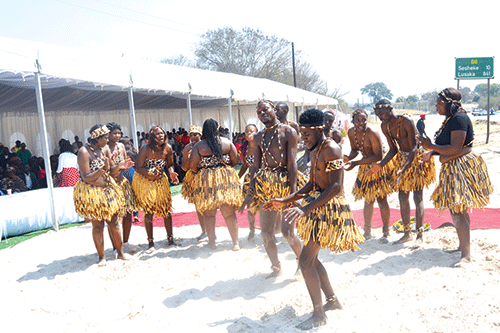KATIMA MULILO – As Katima Mulilo bursts into a hive of activity to host Namibia’s 34th Independence Day, the town enjoys a carnival atmosphere with streets and public facilities cleaned and decorated for tomorrow’s big celebrations.
The Zambezi region is ready to host the celebrations, but all accommodation establishments are fully-booked.
In an interview with New Era yesterday, Zambezi regional governor Lawrence Sampofu confirmed that accommodation remains a challenge.
“Most of our accommodation places are fully-booked. We are looking at whether
people can come and book at Sesheke in Zambia near the Namibian border, at Kongola, as well as Linyanti because there are lodges there,” he noted. Equally, Sampofu called on Zambezi residents (those who can do so) to capitalise on the opportunity to provide accommodation for the day to visitors.
He said those who wish to rent out their houses or flats may consult the preparatory committee on protocol and accommodation for further guidance. Sampofu gave the assurance that the region is 99% ready to host the event, with final touches to have been concluded yesterday.
“Everything is going well. We established six committees. One is on information and publicity to deal with street decorations, banners and flags. They are also providing information regarding the event to the public, especially on pick-up points from different constituencies. We received nine buses to pick up people from these constituencies,” the governor reported. He appealed to residents to be on time at various pick-up points so that they are not late for the event at the Katima Mulilo sports complex tomorrow.
Thus far, he confirmed invitations to
district commissioners from Sesheke in Zambia and the Chobe district in Botswana.
Meanwhile, Ministry of Information and Communication Technology (MICT) spokesperson Shoki Kandjimi said preparations are at an advanced stage at the complex, where the 34th independence anniversary will be held on 21 March 2024. “It’s the first time that the Zambezi region is hosting the Independence celebrations, creating an exciting atmosphere amongst the inhabitants of the region. Moreover, the event will boost the local economy, where local entrepreneurs will benefit from various investments from
the visitors,” he enthused.
The country’s fourth President, Nangolo Mbumba, will deliver the keynote address. It will be his only Independence speech, as he has repeatedly stated that he would not run for office, and would only see out late president Hage Geingob’s last year of his second term.
Namibia gained independence from apartheid South Africa on 21 March 1990.
Kandjimi said Namibians could look forward to cultural performances and a parade by the Namibian Defence Force during the celebrations. New Era engaged University of Namibia (Unam) historian Elliot Mowa to explain Zambezi’s cultural diversity.
He said Zambezi is geographically, socially, culturally and linguistically different from the rest of Namibia. The northeastern region is home to about eight languages and language groups. Furthermore, visitors will be able to see beautiful traditional houses made out of reeds, mud and cow dung, as well as large herds of livestock alongside the national roads within Zambezi.
The population mostly comprises subsistence farmers, mainly Subia and Lozi people, who make their living on the banks of the Zambezi, Kwando, Linyanti and Chobe rivers. Other ethnic groups found in the region include the Mafwe, Mbalangwe, Yeyi and Totela.
“Zambezi is a melting pot of cultures. We have four main different traditional authorities. There are minor differences, but cultures are almost similar. Like the Masubia and Mayeyi have adapted to the environment of living with aquatic animals. They have special local food derived from the aquatic environment ,such as water lilies. They migrate with their livestock during the floods,” he added.
Another jurisdiction he mentioned is the Mafwe tribe, who mainly live in the forest.
“People of Zambezi are warm and friendly. Visitors will enjoy their stay and must visit the market to taste the Zambezi bream, which is a symbol of the region,” he urged.
Additionally, Zambezi houses the Khwe communities who mainly live within the Bwabwata National Park, and they too have their culture and traditions. “The cultures are similar in the way they dance, their mannerisms, and respect for elders and other rituals as well as traditional initiations,” he observed. -anakale@nepc.com.na


